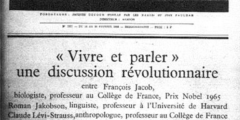Bubbles: A short history
July 6, 2020
Last week we heard a lot about bubbles, especially school bubbles and travel bubbles. This metaphor has been bubbling up for a while during the pandemic and I became curious about how and where it emerged. Then I saw a tweet from Gareth Enticott which contained an article about New Zealand researchers who had come …
CfP: Covid-19 and metaphors special issue
June 3, 2020
Call for contributions to Special Issue of Metaphor and Symbol on: Framing Covid-19: Assessing the Socio-cultural Imagery of the 2020 Corona Pandemic Guest-editors: Martin Döring (University of Hamburg, Germany) Brigitte Nerlich (University of Nottingham, United Kingdom) Context: The global Covid-19 pandemic has led to an explosion of metaphors and symbols. Research tracing and examining this …
Gene drives and Trojan horses: A tale of two metaphor uses
February 28, 2020
I was reading a recent article on gene drive entitled “Engineering bugs, resurrecting species: The wild world of synthetic biology for conservation” and came across this sentence about a so-called ‘Medea drive’: “This genetic Trojan Horse could then be used to spread elements that confer susceptibility to certain environmental factors, such as triggering the death …
New metaphors for new understandings of genomes
February 21, 2020
This is a guest post by Sarah Perrault and Meaghan O’Keefe (University of California Davis) based on their article “New metaphors for new understanding of genomes”. The article goes beyond regular complaints about the inadequacy of old metaphors, such as the genome as a blueprint, and beyond regular calls for a new language. Instead, it …
Metaphors and society (and Brexit)
November 8, 2019
I have been interested in metaphors and society for a long time. My thinking has been influenced mainly by people who wrote about metaphor (and society) at the end of the 1970s and early 1980s; for example, Susan Sontag, Donald Schön, Andrew Ortony, George Lakoff and Mark Johnson and others, who examined ‘conceptual’ or ‘generative’ …
Encounters between life and language
September 5, 2019
Philip Ball has just written a great article dissecting new research showing that there is no ‘gene for’ homosexuality. He notes the fallacies behind the facile way of pointing to individual genes and saying what they are ‘for’. This is dangerous, especially when talking about genes for behavioural traits. Single genes don’t determine such traits …
When is a metaphor not a metaphor?
July 15, 2019
A few weeks ago Daniel Nicholson posted an article on twitter entitled “Are cells really machines?” This made me think, and I wrote a blog post pondering the relations between science, metaphors and technology. In this post I want to reflect on another aspect of the relation between science and metaphors, namely on when metaphors …
Metaphors, machines and the meaning of life
June 30, 2019
Machine metaphors are ubiquitous in biology, nowhere more so than in synthetic biology, a type of biology that is inspired by engineering and design. This has attracted the attention of metaphor analysts, but also of philosophers and ethicists. Various scholars, both from the humanities/social sciences and the life sciences have grappled with some of the …
Witness marks: On the trail of an epigenetic metaphor
May 17, 2019
This is a guest post by Aleksandra Stelmach, University of Nottingham, Institute for Science and Society In a previous post Brigitte Nerlich and I briefly discussed the emergence of a seemingly new metaphor used in popular discussion about epigenetic effects of nutrition on offspring and, potentially, future generations. In this post I try to track …
It’s an icon, it’s a symbol: It’s a polar bear!?
April 19, 2019
A while ago Saffron O’Neill asked me whether one should call polar bear images a climate change synecdoche or a climate change metonym? That was a good question and I should know the answer! Indeed she asked me because she thought I was an expert on that sort of stuff! I have written about metaphors. I …
Subscribe by email
About this blog
This blog promotes discussion of topics related to the research programme 'Making Science Public: Challenges and Opportunities'. Our purpose is not to 'make science public'. Instead, we want to study the opportunities that have emerged for science to be more openly practiced and debated, but also the challenges posed by making science public or by promoting the making public of science as a solution to a variety of problems in society and in politics.
This blog will report on these and other issues related to the Leverhulme funded research programme: Making Science Public: Challenges and Opportunities
Useful links
Recent Posts
- Climate change and climate discourse: A dual disintegration
- Erving Goffman: Memories, method and metaphors
- Participation at the core: AI, ELSI and community engagement
- Understanding computational hermeneutics: Making meaning between the past and the present
- AI winter and AI bubble: Historical and metaphorical reflections
 MSP bookmarks
MSP bookmarks
- Twitter May 8, 2017
- Social innovations in Europe #RRI November 3, 2015
- Harvey Graff, the undisciplinarian September 20, 2015
- Replacing Pesticides With Genetics August 31, 2015
- Addressing hazardous chemicals in the circular economy August 25, 2015
Categories
- antibiotics
- anticipatory governance
- artifical intelligence
- big data
- biotechnology
- citizen science
- Climate Change
- Climate Politics
- co-production
- coronavirus
- Creationism
- Definition of Science
- designer babies
- disease
- disease
- engineering
- epigenetics
- Food Security
- Food sovereignty
- gene drive
- genomics
- GM Food
- GMOs
- history of science
- Hype
- images and visualisations
- imaginaries
- Immigration
- Impact
- infectious diseases
- innovation
- interdisciplinarity
- Knowledge Society
- Language
- Markets
- Metaphors
- microbiome
- neoliberalism
- Neuroscience
- open access
- Personal Reflection
- Politics
- Public education
- public engagement with science
- public needs
- public participation
- public policy
- public service
- publics
- regulatory science
- Religion
- Republican Party
- research impact
- responsible innovation
- responsive research
- Richard Dawkins
- risk
- Scepticism
- Science
- Science and Government
- science and politics
- Science and Songs
- science communication
- Science Communication
- Science Fiction
- Science Policy
- Social science
- sociology
- space
- space exploration
- synthetic biology
- transparency
- Trust
- Uncategorized
- Uncertainty
- visualisation
- wonder










